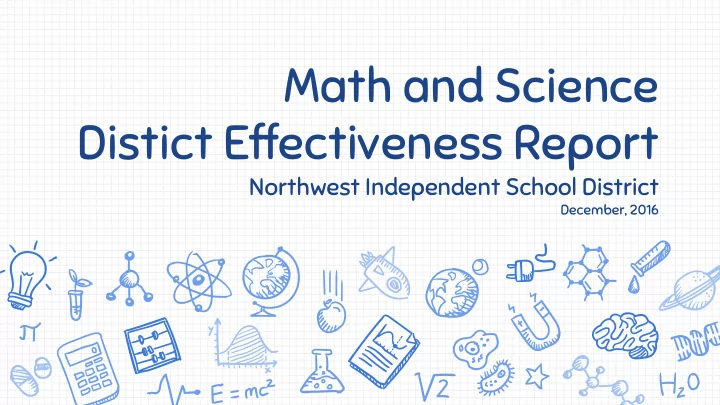

Math and Science Distict Effectiveness Report Northwest Independent School District December, 2016
Mathematics Focus Process Standard 1B - use a problem-solving model that incorporates analyzing given information, formulating a plan or strategy, determining a solution, justifying the solution, and evaluating the problem-solving process and the reasonableness of the solution ✘ Planning and Balancing the Productive Struggle ✘ Fostering Positive Mathematics Disposition ✘ Reasoning & Problem Solving ✘ Increasing Mathematical Communication ✘ Building Procedural Fluency & Conceptual Understanding ✘ Early Intervention using a Diagnostic
Mathematics Focus Process Standard 1D - communicate mathematical ideas, reasoning, and their implications using multiple representations, including symbols, diagrams, graphs, and language as appropriate 1E - create and use representations to organize, record, and communicate mathematical ideas 1F - analyze mathematical relationships to connect and communicate mathematical ideas 1G - display, explain, and justify mathematical ideas and arguments using precise mathematical language in written or oral communication ✘ Increasing Mathematical Communication ✘ Connecting Mathematical Ideas, Representation and Models ✘ Evidence of Daily Critical Writing ✘ Explaining and Justifying Thinking
Science Focus Process Standards - The student uses critical thinking, scientific reasoning, and problem solving to make informed decisions within and outside the classroom. The student is expected to: • 3A – in all fields of science, analyze, evaluate, and critique scientific explanations by using empirical evidence, logical reasoning, and experimental and observational testing, including examining all sides of scientific evidence of those scientific explanations, so as to encourage critical thinking by the student; • 3B - communicate and apply scientific information extracted from various sources such as current events, news reports, published journal articles, and marketing materials; • 3C - draw inferences based on data related to promotional materials for products and services; • 3D - evaluate the impact of research and technology on scientific thought, society, and the environment ✘ Providing hands-on investigation time (K-1 80%, 2-3 60%, 4-5 50%, 6-12 40%) ✘ Increasing critical writing opportunities in science notebooks ✘ Increase use and accuracy of content vocabulary in verbal discussions and notebook entries ✘ Connect math and science through data analysis and conclusions based on evidence
Mathematical & Science Strategies ✘ Word Walls and anchor charts that increase/promote academic vocabulary and math models ✘ Examples and exemplars of student journal entries, that model the level of rigor expected ✘ Provided goal setting documents ✘ Provided training on use of powerful models ✘ Problem solving strategies ✘ Sentence starters to support communication skills ✘ Incorporated fact and computational fluencies checks ✘ Embedded critical writing opportunities in the curricul um ✘ Created K-2 math diagnostic for early intervention
Mathematics Professional Learning ✘ Book Study – 5 Practices for Orchestrating Productive Math Discussions ✘ Using Powerful Models ✘ Early Number Concepts ✘ Guided Math Groups ✘ Problem Solving & Process Skills ✘ Understanding the TEKS & Vertical Alignment ✘ Writing in Math ✘ New Teacher Academy - observing experienced teachers with a designated set of look-fors and reflection after each session ✘ Learning Cycles – Leadership ✘ District PLCs - examining student work for evidence of representations, strategies, multiple solutions, justifications and feedback
Science Professional Learning ✘ Advanced CERs ✘ Science Notebooking ✘ Unpacking TEKS using Thinking Maps ✘ Effective Feedback in Notebooks, Writing in Science ✘ National Math and Science Initiative training for secondary ✘ Learning Cycles - Leadership ✘ New Teacher Academy - observing experienced teachers with a designated set of look-fors and reflection after each session
Daily Problem Solving
Justification & Explanation
Goal Setting
Critical Thinking
Writing in Science
Justifying Thinking
Thank you for your continued support of Curriculum and Professional Learning in NISD!
Recommend
More recommend